2019高二上学期英语期中试题
- 格式:doc
- 大小:564.50 KB
- 文档页数:15
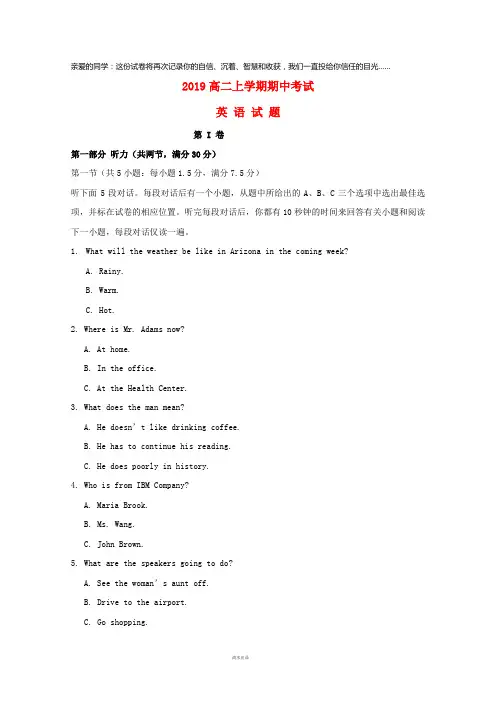
亲爱的同学:这份试卷将再次记录你的自信、沉着、智慧和收获,我们一直投给你信任的目光……2019高二上学期期中考试英语试题第 I 卷第一部分听力(共两节,满分30分)第一节(共5小题:每小题1.5分,满分7.5分)听下面5段对话。
每段对话后有一个小题,从题中所给出的A、B、C三个选项中选出最佳选项,并标在试卷的相应位置。
听完每段对话后,你都有10秒钟的时间来回答有关小题和阅读下一小题,每段对话仅读一遍。
1.What will the weather be like in Arizona in the coming week?A. Rainy.B. Warm.C. Hot.2. Where is Mr. Adams now?A. At home.B. In the office.C. At the Health Center.3. What does the man mean?A. He doesn’t like drinki ng coffee.B. He has to continue his reading.C. He does poorly in history.4. Who is from IBM Company?A. Maria Brook.B. Ms. Wang.C. John Brown.5. What are the speakers going to do?A. See the woman’s aunt off.B. Drive to the airport.C. Go shopping.第二节听下面5段对话或独白。
每段对话或独白后有几个小题,从题中所给的A、B、C三个选项中选出最佳选项,并标在试卷的相应位置。
听每段对话或独白前,你将有时间阅读各个小题,每小题5秒钟;听完后,各小题将给出5秒钟的作答时间。
每段对话或独白读两遍。
听下面一段对话,回答第6至第8三个小题。
6. What is the man?A. A salesclerk.B. A new cashier.C. A manager.7. Why does the woman come here?A. The salesgirl was impolite.B. The goods were of poor qualityC. She didn’t get the promised discount.8. What will the woman get?A. Some money.B. A letter of apology.C. A new product.听下面一段对话,回答第9至第11三个小题。
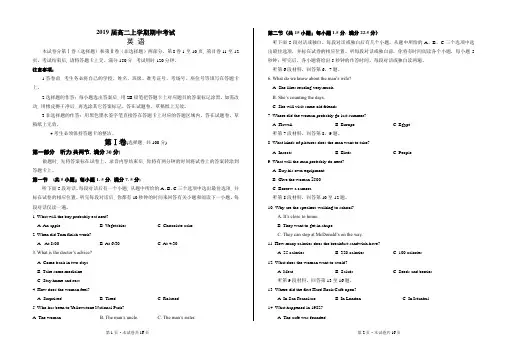
2019届高二上学期期中考试英语本试卷分第Ⅰ卷(选择题)和第Ⅱ卷(非选择题)两部分。
第I卷1至10页, 第Ⅱ卷11至12页。
考试结束后, 请将答题卡上交。
满分150分, 考试用时120分钟。
注意事项:1.答卷前, 考生务必将自己的学校、姓名、班级、准考证号、考场号、座位号等填写在答题卡上。
2.选择题的作答:每小题选出答案后, 用2B铅笔把答题卡上对应题目的答案标记涂黑。
如需改动, 用橡皮擦干净后, 再选涂其它答案标记。
答在试题卷、草稿纸上无效。
3.非选择题的作答:用黑色墨水签字笔直接答在答题卡上对应的答题区域内。
答在试题卷、草稿纸上无效。
4.考生必须保持答题卡的整洁。
第Ⅰ卷(选择题, 共100分)第一部分听力(共两节, 满分30分)做题时, 先将答案标在试卷上。
录音内容结束后, 你将有两分钟的时间将试卷上的答案转涂到答题卡上。
第一节(共5小题;每小题1. 5分, 满分7. 5分)听下面5段对话。
每段对话后有一个小题, 从题中所给的A、B、C三个选项中选出最佳选项, 并标在试卷的相应位置。
听完每段对话后, 你都有10秒钟的时间来回答有关小题和阅读下一小题。
每段对话仅读一遍。
1. What will the boy probably eat next?A. An apple.B. Vegetables.C. Chocolate cake.2. When did Tom finish work?A. At 8:00.B. At 6:30.C. At 4:30.3. What is the doctor’s advice?A. Come back in two days.B. Take some medicine.C. Stay home and rest.4. How does the woman feel?A. Surprised.B. Tired.C. Relaxed.5. Who has been to Yellowstone National Park?A. The woman.B. The man’s uncle.C. The man’s sister.第二节(共15小题;每小题1.5分, 满分22.5分)听下面5段对话或独白。
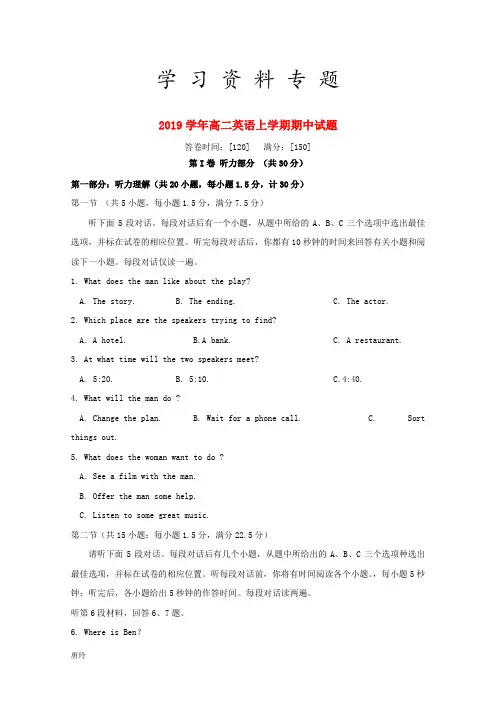
学习资料专题2019学年高二英语上学期期中试题答卷时间:[120] 满分:[150]第I卷听力部分(共30分)第一部分:听力理解(共20小题,每小题1.5分,计30分)第一节(共5小题,每小题1.5分,满分7.5分)听下面5段对话。
每段对话后有一个小题,从题中所给的A、B、C三个选项中选出最佳选项,并标在试卷的相应位置。
听完每段对话后,你都有10秒钟的时间来回答有关小题和阅读下一小题。
每段对话仅读一遍。
1. What does the man like about the play?A. The story.B. The ending.C. The actor.2. Which place are the speakers trying to find?A. A hotel.B.A bank.C. A restaurant.3. At what time will the two speakers meet?A. 5:20.B. 5:10.C.4:40.4. What will the man do ?A. Change the plan.B. Wait for a phone call.C. Sort things out.5. What does the woman want to do ?A. See a film with the man.B. Offer the man some help.C. Listen to some great music.第二节(共15小题:每小题1.5分,满分22.5分)请听下面5段对话。
每段对话后有几个小题,从题中所给出的A、B、C三个选项种选出最佳选项,并标在试卷的相应位置。
听每段对话前,你将有时间阅读各个小题。
,每小题5秒钟;听完后,各小题给出5秒钟的作答时间。
每段对话读两遍。
听第6段材料,回答6、7题。
6. Where is Ben?A. In the kitchen.B. At school.C. In the park.7. What will the children in the afternoon?A. Help set the table.B. Have a party.C. Do their homework.听第7段材料,回答第8、9题8. What are the two speakers talking about?A. A Family holiday.B. A business trip.C. A travel plan.9. Where did Rachel go?A. Spain.B. Italy.C. China.听第8段材料,回答第10至12题。
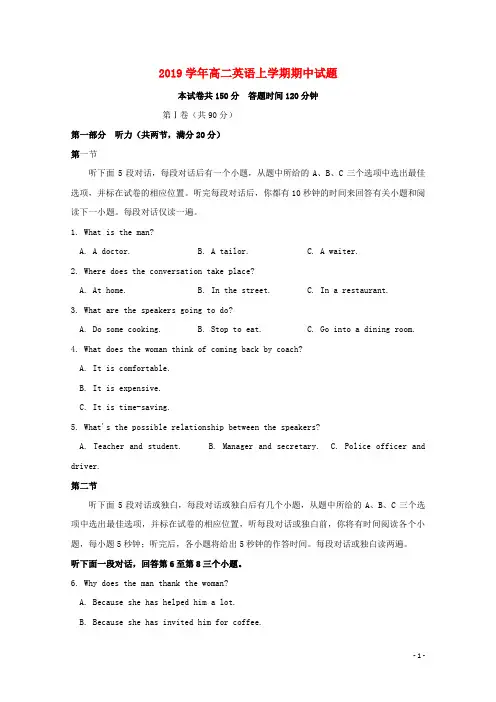
2019学年高二英语上学期期中试题本试卷共150分答题时间120分钟第Ⅰ卷(共90分)第一部分听力(共两节,满分20分)第一节听下面5段对话,每段对话后有一个小题,从题中所给的A、B、C三个选项中选出最佳选项,并标在试卷的相应位置。
听完每段对话后,你都有10秒钟的时间来回答有关小题和阅读下一小题。
每段对话仅读一遍。
1. What is the man?A. A doctor.B. A tailor.C. A waiter.2. Where does the conversation take place?A. At home.B. In the street.C. In a restaurant.3. What are the speakers going to do?A. Do some cooking.B. Stop to eat.C. Go into a dining room.4. What does the woman think of coming back by coach?A. It is comfortable.B. It is expensive.C. It is time-saving.5. What's the possible relationship between the speakers?A. Teacher and student.B. Manager and secretary.C. Police officer and driver.第二节听下面5段对话或独白,每段对话或独白后有几个小题,从题中所给的A、B、C三个选项中选出最佳选项,并标在试卷的相应位置,听每段对话或独白前,你将有时间阅读各个小题,每小题5秒钟;听完后,各小题将给出5秒钟的作答时间。
每段对话或独白读两遍。
听下面一段对话,回答第6至第8三个小题。
6. Why does the man thank the woman?A. Because she has helped him a lot.B. Because she has invited him for coffee.C. Because she has agreed to see him on Monday.7. When does the conversation take place?A. Before class.B. After class.C. After work.8. What is the relationship between the speakers?A. Classmates.B. Teacher and student.C. Relatives.听下面一段对话,回答第9至第11三个小题。
![[精品]2019学年高二英语上学期期中试题新人教版](https://uimg.taocdn.com/61feb2b29b89680203d825b8.webp)
2019学年度第一学期期中考试高二英语试题本试卷分第Ⅰ卷(选择题)和第Ⅱ卷(非选择题)两部分。
第Ⅰ卷1 至 8页,第Ⅱ卷 9至10页。
满分150分。
考试时间120分钟。
第一部分听力理解(共两节,满分30分)第一节 (共 5 小题;每小题 1.5 分,满分 7.5 分)听下面5段对话。
每段对话后有一个小题,从题中所给的A、B、C三个选项中选出最佳选项,并标在试卷的相应位置。
听完每段对话后,你都有10秒钟的时间来回答有关小题和阅读下一小题。
每段对话仅读一遍。
1.What is the price for a silver card?A. $222B. $333C. $5552.What does the man enjoy playing in his free time?A. The drums.B. Ball games.C. Building blocks.3.Who will the man probably turn to?A. Joan.B. Kate.C. Henry.4.Why has the woman made the call?A. To put an ad in the paperB. To buy some papers.C. To rent an apartment.5.What happened to Angela?A. She fell ill suddenly.B. She failed her test again.C. She lost her driving licence.第二节 (共 15 小题;每小题 1.5 分,满分 22.5 分)听下面5段对话或独白。
每段对话或独白后有几个小题,从题中所给的A、B、C三个选项中选出最佳选项,并标在试卷的相应位置。
听每段对话或独白前,你将有时间阅读各个小题,每小题5秒钟;听完后,各小题将给出5秒钟的作答时间。
每段对话或独白读两遍。
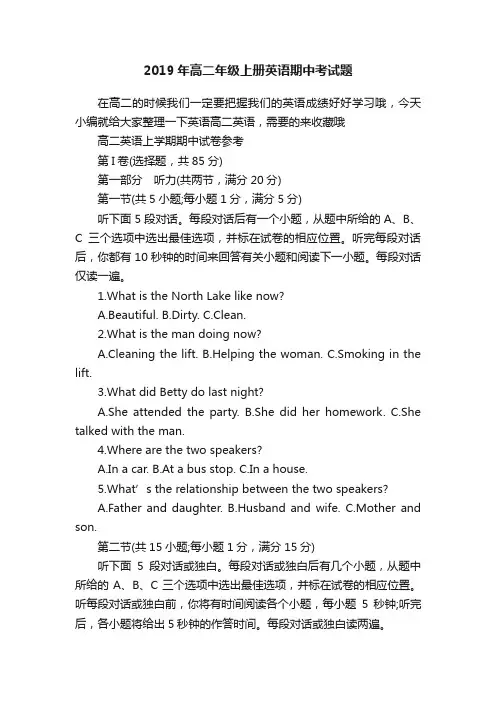
2019年高二年级上册英语期中考试题在高二的时候我们一定要把握我们的英语成绩好好学习哦,今天小编就给大家整理一下英语高二英语,需要的来收藏哦高二英语上学期期中试卷参考第I卷(选择题,共85分)第一部分听力(共两节,满分20分)第一节(共5小题;每小题1分,满分5分)听下面5段对话。
每段对话后有一个小题,从题中所给的A、B、C三个选项中选出最佳选项,并标在试卷的相应位置。
听完每段对话后,你都有10秒钟的时间来回答有关小题和阅读下一小题。
每段对话仅读一遍。
1.What is the North Lake like now?A.Beautiful.B.Dirty.C.Clean.2.What is the man doing now?A.Cleaning the lift.B.Helping the woman.C.Smoking in the lift.3.What did Betty do last night?A.She attended the party.B.She did her homework.C.She talked with the man.4.Where are the two speakers?A.In a car.B.At a bus stop.C.In a house.5.What’s the relationship between the two speakers?A.Father and daughter.B.Husband and wife.C.Mother and son.第二节(共15小题;每小题1分,满分15分)听下面5段对话或独白。
每段对话或独白后有几个小题,从题中所给的A、B、C三个选项中选出最佳选项,并标在试卷的相应位置。
听每段对话或独白前,你将有时间阅读各个小题,每小题5秒钟;听完后,各小题将给出5秒钟的作答时间。
每段对话或独白读两遍。
听第6段对话,回答第6~7题。
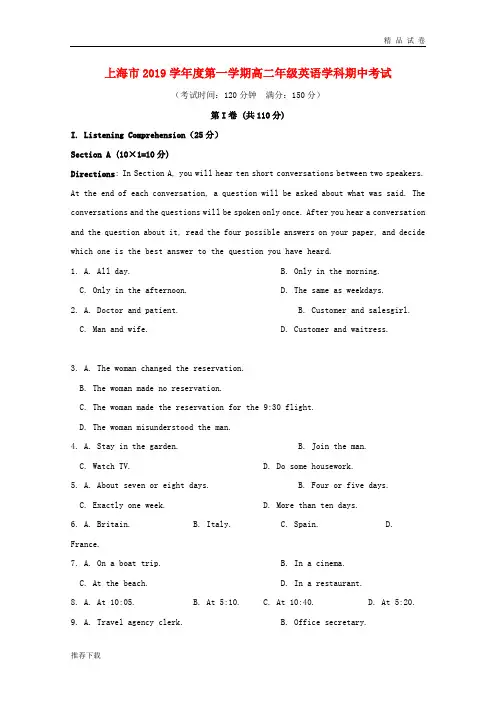
上海市2019学年度第一学期高二年级英语学科期中考试(考试时间:120分钟满分:150分)第I卷 (共110分)I. Listening Comprehension(25分)Section A (10×1=10分)Directions: In Section A, you will hear ten short conversations between two speakers. At the end of each conversation, a question will be asked about what was said. The conversations and the questions will be spoken only once. After you hear a conversation and the question about it, read the four possible answers on your paper, and decide which one is the best answer to the question you have heard.1. A. All day. B. Only in the morning.C. Only in the afternoon.D. The same as weekdays.2. A. Doctor and patient. B. Customer and salesgirl.C. Man and wife.D. Customer and waitress.3. A. The woman changed the reservation.B. The woman made no reservation.C. The woman made the reservation for the 9:30 flight.D. The woman misunderstood the man.4. A. Stay in the garden. B. Join the man.C. Watch TV.D. Do some housework.5. A. About seven or eight days. B. Four or five days.C. Exactly one week.D. More than ten days.6. A. Britain. B. Italy. C. Spain. D. France.7. A. On a boat trip. B. In a cinema.C. At the beach.D. In a restaurant.8. A. At 10:05. B. At 5:10. C. At 10:40. D. At 5:20.9. A. Travel agency clerk. B. Office secretary.C. Head nurse.D. Hotel receptionist.10.A. 12 years. B. 24 years. C. 6 years. D. 18 years. Section B(10×1.5=15分)Directions: In Section B, you will hear several longer conversation(s) and short passage(s), and you will be asked several questions on each of the conversation(s) and the passage(s). The conversation(s) and the passage(s) will be read twice, but the questions will be spoken only once. When you hear a question, read the four possible answers on your paper and decide which one would be the best answer to the question you have heard.Questions 11 through 13 are based on the following passage.11. A. Having no children gives a couple more freedom.B. Having children in youth brings a couple plenty of joy.C. A couple will enjoy life with their children.D. A couple think of children as a nuisance(讨厌的人).12. A. The desire for a job.B. The desire for a free lifestyle.C. The desire for further education.D. The desire for beauty.13. A. To build a career in communication.B. To have a baby soon.C. To enjoy life better.D. To have a large circle of friends.Questions 14 through 16 are based on the following passage.14. A. People from Holland. B. People from Britain.C. People from Germany.D. The Puerto Ricans.15. A. Asians. B. Irishmen. C. Eastern Europeans. D. Italians.16. A. For adventure. B. For religious freedom.C. For a better life.D. For independence.Questions 17 through 18 are based on the following conversation.17. A. They had difficulty understanding their professor.B. They got stuck in the beginning.C. They had no talent for writing.D. They didn’t like detective stories.18. A. To go shopping. B. To get herself relaxed.C. To look for inspiration for her story.D. To meet Prof. Wilson. Questions 19 through 20 are based on the following conversation.19. A. She has trouble learning English. B. She is often late for class.C. She has won a scholarship.D. She is absent-minded in class.20. A. She is doing well in study.B. She has to deliver milk every morning to earn her school fees.C. Her parents fell ill two months ago.D. She has behaved well in school.II. Grammar and VocabularySection A (10×2=20分)Directions: Read the following passage. Fill in the blanks to make the passage coherent. For the blanks with a given word, fill in each blank with the proper form of the given word. For the other blanks, fill in each blank with one proper word. Make sure that your answers are grammatically correct.Stress:Good or Bad?Stress used to be an almost unknown word, but now that we are used to talking about it, I have found that people are beginning to get stressed about being stressed.In recent years,stress(21)(regard) as a cause of a whole range of medical problems, from high blood pressure to mental illness. But like so many other things, it is only too much stress(22) does you harm. It is time you(23)________(consider) that if there were no stress in your life, you would achieve a little. If you are stuck at home with no stress, then your level of performance will be low. Up to a certain point, the more stress you are under, the(24)_______(good) your performance will be. Beyond a certain point, though, further stresswill only lead to exhaustion, illness and finally a breakdown. You can tell when you are over the top and on the downward slope, by asking yourself (25) number of questions. Do you, for instance, feel that too much is being expected of you, and yet find(26) impossible to say no?Do you find yourself getting impatient or(27)(annoy)with people over unimportant things?…If the answer to all those questions is yes, you had better(28)(control)your stress, as you probably are under more stress than is good for you.To some extent, you can control the amount of stress in your life. Doctors have worked out a chart showing how much stress is involved(29)_______various events. Getting married is 50, pregnancy 40, moving house 20, Christmas 12, etc. If the total stress in your life is over 150, you are twice as likely(30)(get)ill.Section B (10分)Directions: Complete the following passage by using the words in the box. Each word can only be used once. Note that there is one word more than you need.In a society, such as the United States or Canada, which has many national, religious, and cultural differences, people___31___ value individualism——the differences among people. Teachers place a lot of importance on the____32___ that make each student special. The educational systems in these countries show these values. Students do not memorize information. Instead, they work ____33____and find answers themselves. There is often discussion in the classroom. At an early age, students learn to form their own ideas and opinions.In most Asian societies, on the contrary, people have the same language, history, and culture. Perhaps for this reason, the educational system in much of the Orient___34____ society’s belief in group goals and purposes rather than individualism. Children in China, Japan, and Korea often work together and help one another on assignments. In the classroom, the teaching __35____ are often very formal. The teacher lectures, and the students listen. There is not much discussion. Instead, the students recite rules or information that they have memorized.There are advantages and disadvantages to both of these____36___ of education. For example, one advantage to the system in Japan is that students there learn much more math and science than American students learn by the end of high school. They also study more hours each day and more days each year than North Americans do. The system is difficult, but it ___37___students for a society that values discipline and self-control. There is, however, a disadvantage. Memorization is an____38_____ learning method in Japanese schools, yet many students say that after an exam, they forget much of the information they have memorized.The advantage of the educational system in North America, on the other hand, is that students learn to think for themselves. The system prepares them for a society that values ___39____ ideas. There is, however, a disadvantage. When students graduate from high school, they haven't ___40____as many basic rules and facts as students in other countries have.III. Reading ComprehensionSection A (15分)Directions: For each blank in the following passage there are four words or phrases marked A, B, C and D. Fill in each blank with the word or phrase that best fits the context.Just as the stock market rises and falls in response to what people are willing to put their money behind, we have inside ourselves an inner economy that rises and falls in response to our beliefs about what is possible.Sometimes the degree to which we are willing to (41)our belief systems determines the success of our inner economy.For example, imagine that your family of origin had a belief that musical talent was not something they(42). As a member of that group, you would likely(43) that same belief about yourself. As a result, even if you had a great desire to create music, you might be (44)to really get behind yourself.Because you might fear that your (45) would not pay off.Even if you had the courage to follow your passion, your inner belief that you are not (46)would probably stop your trying.And that would be a major (47) to invest your energy in your dream.On the other hand,belief isn't anything (48).If you found a way to (49)_______ that negative belief, a great flood of energy would pour forth, greatly increasing the possibility of your success. How much energy we are willing to invest in the various ideas and dreams is like the money people are, or are not, willing to invest in the various products available for trade on the stock market.And in both cases, (50) plays a key role in determining how willing we are to get behind something.One way to open up the possibility for greater success in our inner economies is to understand that belief is not the reliable(51) we sometimes think.There are other more reliable things of success that we can put our (52) in, such as passion, feeling, and sense.Some of the most successful investors in the stock market are the ones that go against the grain, trusting their sense over the(53) opinion held by ordinary people about what will work.In the same way,we can learn to trust our heart's desires and our sense to guide us,(54)____ any beliefs that stand in the way of our ability to fully invest in ourselves. As we take out energy from limiting ideas about what is possible, we (55) the resources that have the power to make our inner economy prosper.41.A.simplify B.challenge C.eliminate D.maintain 42.A.possessed B.trusted C.objected D.missed 43.A.reject B.preserve C.deny D.share 44.A.willing B.sorry C.reluctant D.ready 45.A.success B.knowledge C.profession D.investment 46.A.devoted B.talented C.concerned D.interested 47.A.obstacle B.excuse C.chance D.principle48.A.important B.fixed C.changeable D.stimulating 49.A.enhance B.reserve C.release D.follow 50.A.energy B.hobby C.expense D.belief 51.A.guide B.ability C.goal D.policy 52.A.aim B.faith C.task D.dream 53.A.unacceptable B.strange C.unbelievable D.common 54.A.questioning B.understanding C.interpreting D.believing 55.A.stick to B.lead to C.free up D.leave outSection B(11×2=22分)Directions: Read the following three passages. Each passage is followed by several questions or unfinished statements. For each of them there are four choices marked A, B, C and D. Choose the one that fits best according to the information given in the passage you have just read.(A)Today, we tell about a popular graduate degree known as the MBA. The letters represent the words Master of Business Administration.MBA students learn to deal with all kinds of business situations. They learn to solve business problems. They develop skills needed by many different kinds of companies.All MBA programs teach students about subjects including economics, the structure of organizations, finance, marketing and policy. Students then do more study in areas that interest them. It usually takes two years to get an MBA degree if you attend school full-time. Many programs permit students to take classes while they work. These programs take longer to complete.Business is one of the most popular areas of study for foreign students in the United States. To be admitted to an MBA programs, foreign students must show a clear understanding of English by taking the TOEFL test. All students must also take theGraduate Management Admission Test (GMAT). The scores on this test are used by more than 1,500 graduate programs throughout the world.Studying for an MBA can be costly. The program at the University of Virginia, for example, costs more than $22,000 a year. That cost does not include housing and food. Foreign students can get financial aid for MBA studies after the first year. The Darden School of Business at the University of Virginia today has 120 foreign students studying for an MBA degree.To get information about studying for an MBA, use the computer and go to a website called MBA Explorer. The Internet address is . Another way is to go to a meeting of the Graduate Management Admission Council. These meetings are called MBA Forums. They are held in different cities in several areas of the world. At the MBA Forums, representatives of business colleges explain their programs and answer questions from people interested in studying business.56. Which of the following is NOT mentioned in the MBA program?A. The structure of organization.B. Policy.C. Economics.D. Mathematics.57. MBA Forums are_____________.A. held in different cities in AmericaB. to help MBA students to learn to deal with all personal problemsC. the meeting of the Post-graduate Management Administration CouncilD. the meetings where representatives of business colleges can explain their programs58. Studying for an MBA degree, all the students______.A. can get financial aid for MBA studies after the first yearB. can get a degree after one year of studyC. develop skills needed by many different kinds of companiesD. who study at the University of Virginia must pay no more than $22,000 a yearexcluding housing and food.59. Which of the following statements is NOT true?A. MBA stands for Master of Business Administration.B. To get an MBA degree, you should usually spend two years in attending school full-time.C. Economics is the most popular area of study in the United States.D. All students applying for an MBA program must take the GMAT.(B)60. How often will an employee generally get paid?A. Every Friday.B. Every two weeks.C. Every week.D. Every other Monday.61. Who has the authority to approve the overtime an employee wishes to do?A. Cashier.B. Safety department officer.C. Supervisor.D. Human resources officer.62. Where should employees go if they wish to have the parking charge taken off their salary?A. Human Resources.B. Business Office.C. Cashier’s Office.D. Safety Department.(C)Talking to human-like devices can be great fun – just ask Siri to tell you a joke. But it may also lead to problems.A recent study by scientists from the University of Kansas (KU) in the US found that human-like devices keep people from seeking out normal human interaction when they feel lonely.During a series of experiments, participants were asked to write about a time w hen they felt lonely. They also took part in an online game of “catch” against a computer program that was designed to “throw” the ball to other players more often, but participants believed they were playing with real people online.Participants were then introduced to human-like products, including a vacuum cleaner (真空吸尘器) designed to appear as if it were smiling. They were also asked to think about their phone in human-like terms, considering questions like “how much does it help you?”The results showed that the participants were happy with the comfort they got from the machines and didn’t need to seek out normal human interaction.Generally, when people feel socially excluded, they seek out other ways to reduce the feeling of loneliness. Normal ways include increasing their number of social media friends or engaging in behaviors to seek out interaction with other people, according to Jenny Olson, assistant professor of marketing at KU.But it wasn’t all bad news, as the team found that there were limits to how far this effect would extend.“As soon as we tell people we know that it looks like the [vacuum cleaner] is smiling, they seemed to realize it was a machine and not a person,” Olson told Daily Mail. “The effect goes away. This seems to be happening on a very subconscious level.”Researchers believe the results are important for consumers to realize how these types of products could affect their social interaction with real people, especially because so many new products feature interactivity.“If som eone notices they are talking more to Siri lately, maybe that has something to do with feeling lonely,” Olson said. “From that standpoint, it’s important to be aware of it.”The study could also help companies design products that can increase the well-being of people who feel lonely, without sacrificing normal social interaction.“Maybe it is more about improving our current relationships,” Olson said, “such as taking a break from screen time and focusing on developing your real personalconnections.”63. Researchers from the University of Kansas found that________.A. human-like devices may help people interact with others.B. interaction with human-like devices may make people feel lonely.C. lonely people may easily become addicted to human-like devices.D. human-like devices may reduce people’s social interaction in real life.64. During the experiments, participants__________.A. were allowed to talk with human-like devices.B. were shown devices with human features.C. played online games with both machines and real people.D. were encouraged to engage in normal human interaction.65. The underlined phrase “this effect”in Paragraph 7 refers to the fact that________.A. lonely people are more likely to seek out interaction with other people.B. lonely people are content to only interact with human-like machines.C. the feeling of loneliness deepens as people interact more with human-like devices.D. people who are socially excluded would get uninterested in socializing.66. What is the significance of the study according to Jenny Olson?A. It shows people why human-like products make them feel lonely.B. It warns people to stop using human-like devices completely and focus on realsocial interaction.C. It may help the well-being of people who feel lonely and improve their currentrelationships.D. It points out the effects of human-like devices and could help companies improvetheir products.Section C (4×2=8分)Directions: Read the following passage. Fill in each blank with a proper sentence given in the box. Each sentence can be used only once. Note that there are two more sentences than you need.In 2009, the number of hungry people in the world reached one billion for the first time. It's difficult not to be shocked by the fact that more than one in seven people in the world do not have enough to eat. 67 Hunger kills more people per year than diseases such as AIDS, malaria(疟疾)and TB (肺结核) combined.The UN estimates that almost two thirds of the world's hungry people are in Asia, which is of course the world's most populous continent. 68 Although this region has a much lower population than Asia, it has the highest percentage of hungry people. Almost all of the rest are in Latin America, North Africa and the Caribbean. In the richest regions of the world there are only a tiny number of people who don’t have enough to eat.69 They include wars, droughts, floods, and the over-use of farming land. All these factors affect food production. Many people also blame greedy businessmen for pushing up the prices of basic foods in the global market. But the most important reason, quite simply, is poverty, which has increased recently due to the financial crisis of 2008.Although many people make the obvious point that there would be less hunger if the global population were smaller, few people would argue that there is not enough food to go around. The basic problem seems to be not a lack of food, but its distribution. In the last 50 years, global food production has risen even more quickly than the global population. There are many areas of the world in which people generally havemore than enough food. 70 The answer to world hunger, therefore, may be a balanced food distribution around the whole world. Everyone will have enough to eat, but not overeat.IV. Summary Writing (10分)Directions: Read the following passage. Summarize the main idea and the main points of the passage in no more than 60 words. Use your own words as far as possible.Most people want to be happy, but few know how to find happiness. Money and success alone do not bring lasting happiness. Aristotle, a Greek thinker, said, "Happiness depends upon ourselves." In other words, we make our own happiness. Here are a few suggestions to help you be happier.The first secret of happiness is to enjoy the simple things in life. Too often, we spend too much time thinking about the future-for example, getting into college or getting a good job-that we fail to enjoy the present. You should enjoy life's simple pleasures, such as reading a good book, listening to your favorite music, or spending time with close friends. People who have several close friends often live happier and healthier lives.Another secret to living a happy life is to be active. Many people go dancing or play sports. People can forget about their problems and only think about the activities.Finally, many people find happiness in helping others. Studies show that people feel good when they spend their time helping others. If you want to feel happier, do good things for someone. You can help a friend with his or her studies, go shopping to buy food for an elderly person, or simply help out around the house by washing the dishes.第II 卷 (共40分)I. Translation(3+3+4+5=15分)Directions: Translate the following sentences into English, using the words givenin the brackets.71. 据说他不久就要被提升为总经理。
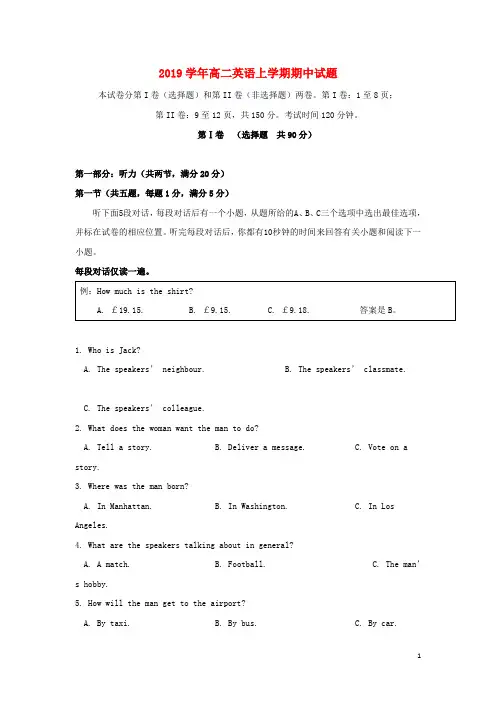
2019学年高二英语上学期期中试题本试卷分第I卷(选择题)和第II卷(非选择题)两卷。
第I卷:1至8页;第II卷:9至12页,共150分。
考试时间120分钟。
第Ⅰ卷(选择题共90分)第一部分:听力(共两节,满分20分)第一节(共五题,每题1分,满分5分)听下面5段对话,每段对话后有一个小题,从题所给的A、B、C三个选项中选出最佳选项,并标在试卷的相应位置。
听完每段对话后,你都有10秒钟的时间来回答有关小题和阅读下一小题。
每段对话仅读一遍。
1. Who is Jack?A. The speakers’ neighbour.B. The speakers’ classmate.C. The speakers’ colleague.2. What does the woman want the man to do?A. Tell a story.B. Deliver a message.C. Vote on a story.3. Where was the man born?A. In Manhattan.B. In Washington.C. In Los Angeles.4. What are the speakers talking about in general?A. A match.B. Football.C. The man’s hobby.5. How will the man get to the airport?A. By taxi.B. By bus.C. By car.第二节(共 15 小题;每小题 1 分,满分15 分)听下面5段对话或独白。
每段对话或独白后有几个小题,从题中所给的A、B、C三个选项中选出最佳选项。
听每段对话或独白前,你将有时间阅读各个小题,每小题5秒钟;听完后,各小题将给出5秒钟的作答时间。
每段对话或独白读两遍。
听第6段材料,回答第6、7题。
6. What colour sofa does the woman first recommend?A. Grey.B. Red.C. Blue and orange.7. Why is the woman unsatisfied with the green sofa?A. It is too bright.B. It is not the right size.C. It won’t go with other furniture.听第7段材料,回答第8、9题。
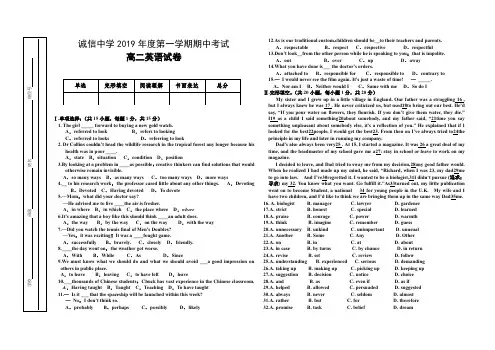
诚信中学2019年度第一学期期中考试高二英语试卷Ⅰ.单项选择:(共15小题,每题1分,共15分)1.The girl _____ forward to buying a new gold watch.A.referred to look B.refers to lookingC.referred to looks D.referring to look2.Dr Collins couldn’t head the wildlife research in the tropical forest any longer because hishealth was in poor ____.A.state B.situation C.condition D.position3.By looking at a problem in ____as possible,creative thinkers can find solutions that wouldotherwise remain invisible.A.so many ways B.as many ways C.too many ways D.more ways4.__ to his research work,the professor cared little about any other things. A.DevotingB.Devoted C.Having devoted D.To devote5.—Mom,what did your doctor say?—He advised me to live ____the air is fresher.A.in where B.in which C.the place where D.where6.It’s amazing that a boy like this should think ____an adult does.A.the way B.by the way C.on the way D.with the way7.—Did you watch the tennis final of Men’s Doubles?—Yes,it was exciting!It was a ____fought game.A.successfully B.bravely. C.closely D.friendly.8.____the day went on,the weather got worse.A.With B.While C.As D.Since9.We must know what we should do and what we should avoid ___a good impression onothers in public place.A.to leave B.leaving C.to have left D.leave10.___thousands of Chinese students,Chuck has vast experience in the Chinese classroom.A.Having taught B.Taught C.Teaching D.To have taught11.—Is it ___ that the spaceship will be launched within this week?—No,I don’t think so.A.probably B.perhaps C.possibly D.likely12.As is our traditional custom,children should be__to their teachers and parents.A.respectable B.respect C.respective D.respectful13.Don’t look__from the other person while he is speaking to you;that is impolite.A.out B.over C.up D.away14.What you have done is___ the doctor’s orders.A.attached to B.responsible for C.responsible to D.contrary to15.—I would never see the film again. It’s just a waste of time!—_____.A.Nor am I B.Neither would I C.Same with me D.So do IⅡ.完形填空。
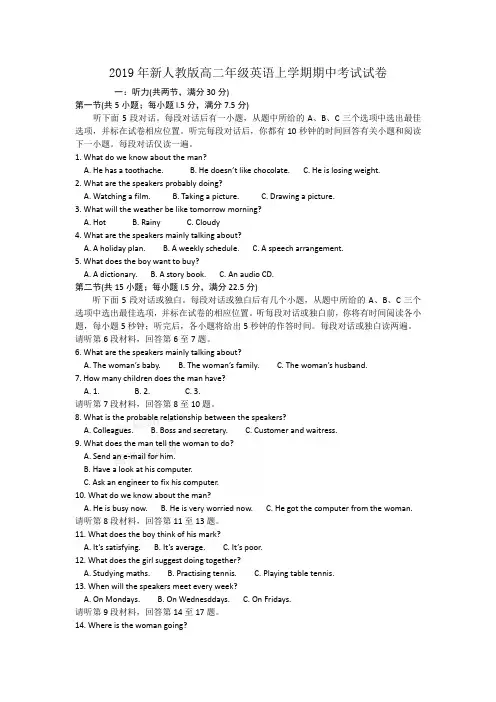
2019年新人教版高二年级英语上学期期中考试试卷一:听力(共两节,满分30分)第一节(共5小题;每小题l.5分,满分7.5分)听下面5段对话。
每段对话后有一小题,从题中所给的A、B、C三个选项中选出最佳选项,并标在试卷相应位置。
听完每段对话后,你都有10秒钟的时间回答有关小题和阅读下一小题。
每段对话仅读一遍。
1. What do we know about the man?A. He has a toothache.B. He doesn’t like chocolate.C. He is losing weight.2. What are the speakers probably doing?A. Watching a film.B. Taking a picture.C. Drawing a picture.3. What will the weather be like tomorrow morning?A. HotB. RainyC. Cloudy4. What are the speakers mainly talking about?A. A holiday plan.B. A weekly schedule.C. A speech arrangement.5. What does the boy want to buy?A. A dictionary.B. A story book.C. An audio CD.第二节(共15小题;每小题l.5分,满分22.5分)听下面5段对话或独白。
每段对话或独白后有几个小题,从题中所给的A、B、C三个选项中选出最佳选项,并标在试卷的相应位置。
听每段对话或独白前,你将有时间阅读各小题,每小题5秒钟;听完后,各小题将给出5秒钟的作答时间。
每段对话或独白读两遍。
请听第6段材料,回答第6至7题。
6. What are the speakers mainly talking about?A. The woman’s baby.B. The woman’s family.C. The woman’s husband.7. How many children does the man have?A. 1.B. 2.C. 3.请听第7段材料,回答第8至10题。
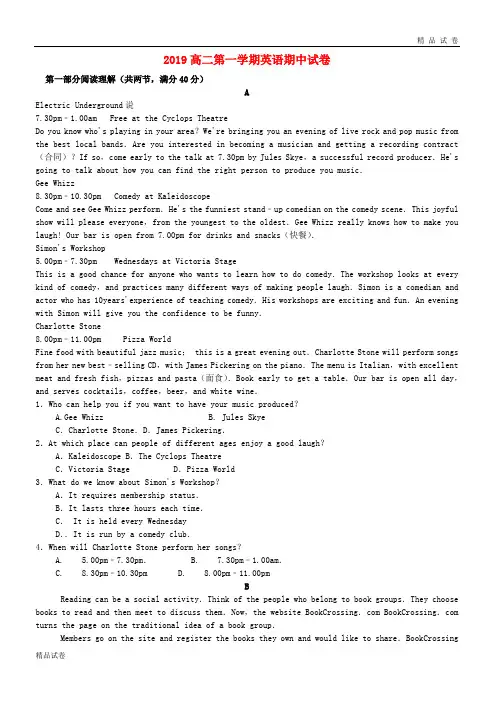
2019高二第一学期英语期中试卷第一部分阅读理解(共两节,满分40分)AElectric Underground说7.30pm﹣1.00am Free at the Cyclops TheatreDo you know who's playing in your area?We're bringing you an evening of live rock and pop music from the best local bands.Are you interested in becoming a musician and getting a recording contract (合同)?If so,come early to the talk at 7.30pm by Jules Skye,a successful record producer.He's going to talk about how you can find the right person to produce you music.Gee Whizz8.30pm﹣10.30pm Comedy at KaleidoscopeCome and see Gee Whizz perform.He's the funniest stand﹣up comedian on the comedy scene.This joyful show will please everyone,from the youngest to the oldest.Gee Whizz really knows how to make you laugh! Our bar is open from 7.00pm for drinks and snacks(快餐).Simon's Workshop5.00pm﹣7.30pm Wednesdays at Victoria StageThis is a good chance for anyone who wants to learn how to do comedy.The workshop looks at every kind of comedy,and practices many different ways of making people laugh.Simon is a comedian and actor who has 10years'experience of teaching comedy.His workshops are exciting and fun.An evening with Simon will give you the confidence to be funny.Charlotte Stone8.00pm﹣11.00pm Pizza WorldFine food with beautiful jazz music; this is a great evening out.Charlotte Stone will perform songs from her new best﹣selling CD,with James Pickering on the piano.The menu is Italian,with excellent meat and fresh fish,pizzas and pasta(面食).Book early to get a table.Our bar is open all day,and serves cocktails,coffee,beer,and white wine.1.Who can help you if you want to have your music produced?A.Gee WhizzB. Jules SkyeC.Charlotte Stone.D.James Pickering.2.At which place can people of different ages enjoy a good laugh?A.Kaleidoscope B.The Cyclops TheatreC.Victoria Stage D.Pizza World3.What do we know about Simon's Workshop?A.It requires membership status.B.It lasts three hours each time.C. It is held every WednesdayD..It is run by a comedy club.4.When will Charlotte Stone perform her songs?A. 5.00pm﹣7.30pm.B. 7.30pm﹣1.00am.C. 8.30pm﹣10.30pmD. 8.00pm﹣11.00pmBReading can be a social activity.Think of the people who belong to book groups.They choose books to read and then meet to discuss them.Now,the website BookCrossing.com BookCrossing.com turns the page on the traditional idea of a book group.Members go on the site and register the books they own and would like to share.BookCrossingprovides an identification number to stick inside the book.Then the person leaves it in a public place,hoping that the book will have an adventure,traveling far and wide with each new reader who finds it.Bruce Pederson,the managing director of BookCrossing,says,"The two things that change your life are the people you meet and books you read.BookCrossing combines both."Members leave books on park benches and buses,in train stations and coffee shops.Whoever finds their book will go to the site and record where they found it.People who find a book can also leave a journal entry describing what they thought of it.E ﹣mails are then sent to the BookCrossing to keep them updated about where their books have been found.Bruce peterson says the idea is for people not to be selfish by keeping a book to gather dust on a shelf at home.BookCrossing is part of a trend among people who want to get back to the"real"and not the virtual (虚拟).The site now has more than one million members in more than one hundred thirty﹣five countries.5.Why does the author mention book groups in the first paragraph?A.To introduce BookCrossingB.To explain what they areC.To stress the importance of reading.D.To encourage readers to share their ideas.6.What does the underlined word "it" in Paragraph 2 refer to?A. An adventure B.The bookC.A public place. D.The identification number.7.What will a BookCrosser do with a book after reading it?A.Meet other readers to discuss it.B.Keep it safe in his bookcase.C.Mail it back to its ownerD.Pass it on to another reader8 .What is the best title for the text?A.Online Reading:A Virtual TourB.Electronic Books:A new TrendC.A Website Links People through BooksD.A Book Group Brings Tradition BackCBad news sells.If it bleeds,it leads.No news is good news,and good news is no news.Those are the classic rules for the evening broadcasts and the morning papers.But now that information is being spread and monitored(监控) in different ways,researchers are discovering new rules.By tracking people's e﹣mails and online posts,scientists have found that good news can spread faster and farther than disasters and sob stories."The ‘if it bleeds'rule works for mass media,"says Jonah Berger,a scholar at the University of Pennsylvania."They want your eyeballs and don't care how you're feeling.But when you share a story with your friends,you care a lot more how they react.You don't want them to think of you as a Debbie Downer."Researchers analyzing word﹣of﹣mouth communication﹣e﹣mails,Web posts and reviews,face ﹣to﹣face conversations﹣found that it tended to be more positive than negative,but that didn't necessarily mean people preferred positive news.Was positive news shared more often simply because people experienced more good things than bad things?To test for that possibility,Dr.Berger looked at how people spread a particular set of news stories:thousands of articles on The New York Times'website.He and a Penn colleague analyzed the" most e﹣mailed "list for six months.One of his first finds was that articles in the science section were much more likely to make the list than non﹣science articles.He found that science amazed Times ‘readers and made them want to share this positive feeling with others.Readers also tended to share articles that were exciting or funny,or that inspired negative feelings like anger or anxiety,but not articles that left them merely sad.They needed to be aroused (激发) one way or the other,and they preferred good news to bad.The more positive an article,the more likely it was to be shared,as Dr.Berger explains in his new book,"Contagious:Why Things Catch On."9.What do the classic rules mentioned in the text apply to?A. Research papers B.News reports.C.Private e﹣malls. D.Daily conversations.10.What can we infer about people like Debbie Downer?A.They're socially inactive.B.They're good at telling stories.C. They're careful with their wordsD.They're inconsiderate of others.11.Which tended to be the most e﹣mailed according to Dr。
2019学年度第一学期期中考试高二英语试题本试卷分第Ⅰ卷(选择题)和第Ⅱ卷(非选择题)两部分。
第Ⅰ卷1 至 8页,第Ⅱ卷 9至10页。
满分150分。
考试时间120分钟。
第一部分听力理解(共两节,满分30分)第一节 (共 5 小题;每小题 1.5 分,满分 7.5 分)听下面5段对话。
每段对话后有一个小题,从题中所给的A、B、C三个选项中选出最佳选项,并标在试卷的相应位置。
听完每段对话后,你都有10秒钟的时间来回答有关小题和阅读下一小题。
每段对话仅读一遍。
1.What is the price for a silver card?A. $222B. $333C. $5552.What does the man enjoy playing in his free time?A. The drums.B. Ball games.C. Building blocks.3.Who will the man probably turn to?A. Joan.B. Kate.C. Henry.4.Why has the woman made the call?A. To put an ad in the paperB. To buy some papers.C. To rent an apartment.5.What happened to Angela?A. She fell ill suddenly.B. She failed her test again.C. She lost her driving licence.第二节 (共 15 小题;每小题 1.5 分,满分 22.5 分)听下面5段对话或独白。
每段对话或独白后有几个小题,从题中所给的A、B、C三个选项中选出最佳选项,并标在试卷的相应位置。
听每段对话或独白前,你将有时间阅读各个小题,每小题5秒钟;听完后,各小题将给出5秒钟的作答时间。
每段对话或独白读两遍。
2019学年高二英语上学期期中试题本试卷分选择题和非选择题两部分,共12页,满分150分,考试用时120分钟。
注意事项:1.答卷前,考生务必用黑色字迹的钢笔或签字笔将自己的姓名、考号填写在答题卡上。
2.选择题每小题选出答案后,用2B铅笔把答题卡上对应题目的答案标号涂黑;如需改动,用橡皮擦干净后,再选涂其它答案;不能答在试卷上。
3.非选择题必须用黑色字迹的钢笔或签字笔作答,答案必须写在另发的答题卷各题目指定区域内的相应位置上;如需改动,先划掉原来的答案,然后再写上新的答案;不准使用铅笔和涂改液。
不按以上要求作答的答案无效。
4.考生必须保持答题卡的整洁,考试结束后,将答题卷和答题卡一并收回。
I.听力(共两节,满分15分)第一节听对话或独白 (共9小题;每小题1分,满分9分)听下面3段对话或对白。
每段对话或独白后有几个小题,从题中所给的A、B、C 三个选项中选出最佳选项,并标在试卷的相应位置。
听每段对话或独白前,你将有时间阅读各个小题,每小题5秒钟;听完后,各小题将给出5秒钟的作答时间。
每段对话或独白读两遍。
听第一段对话,回答第l至3题。
现在,你有15秒钟的时间阅读这三个小题。
1. The woman is reading ________.A. a newspaperB. a magazineC. her essay2. The woman doesn’t seem to think that ________.A. the Ice Age people were advancedB. there were societies in the Ice AgeC. Ice Age people were cave people3. The new exhibit shows all the following except that ________.A. Ice Age people invented musicB. Ice Age people could build houses with woodC. cold weather killed most of the trees听第二段对话,回答第4至6题。
2019学年高二上学期期中考试英语试题2017.11本试卷分第一卷(选择题)和第二卷(非选择题)两部分,满分120分,考试时间120 分钟。
考试结束后,请将答题卡和答题卷交回。
第I卷(共70分)第一部分听力(共两节,满分15分)做题时先将答案标在试卷上,录音内容结束后,你讲有两分钟的时间将试卷上的答案转涂到答题卡上。
第一节(共5小题;每小题1.5分,满分7.5分)听下面5段对话。
每段对话后有一个小题,从题中所给的A、B、C三个选项中选出最佳选项,并标在试卷的相应位置。
听完每段对话后,你都有10秒钟的时间来回答有关小题和阅读下一小题。
每段对话仅读一遍。
1. What does the man mean?A. John cannot play the piano.B. John wants to be a writer.C. John is busy at the moment.2. What is the woman doing?A. Helping a friend find the right department.B. Buying herself some shoes.C. Taking a class at the gym.3. Who is this woman talking to?A. James.B. Robert.C. Paul.4. How will the woman get to Scotland?A. By car.B. By plane.C. By bus.5. Why was the man late?A. His car was out of petrol.B. He couldn't mend his car.C. He had to go back for clean clothes.第二节(共10小题;每小题1分,满分10分)听下面4段对话或对白,每段对话或独白后有几个小题,从题中所给的A、B、C三个选项中选出最佳选项,并标在试卷的相应位置,听每段对话或独白前,你将有时间阅读各个小题。
2019学年度第一学期本部高二普通班期中考试英语试题第I卷第一部分听力第一节(共5小题,每小题1.5分,满分7.5分)听下面5段对话。
每段对话后有一个小题,从题中所给的A,B,C三个选项中选出最佳选项。
听完每段对话后,你都有10秒钟的时间来回答有关小题和阅读下一小题。
每段对话仅读一遍。
1. When did the man see Jim?A. At 3 o’clock.B. At 4 o’clock. C . At 5o’clock.2. What are the two speakers talking about?A. A film.B. A famous man.C. The weather.3. What do we learn from the conversation?A. The weather will soon get warmer.B. The weather may get even colder. .C. They are having the warmest winter ever..4. What’s the man doing?A. Ordering.B. Asking for help.C. Looking for a doctor.5. How much does the man need to pay?A. 3 yuan.B. 2 yuan.C. 6 yuan.第二节(共15小题,每小题1.5分,满分22.5分)听下面5段对话或独白。
每段对话或独白后有几个小题,从题中所给的A,B,C三个选项中选出最佳选项。
听每段对话或独白前,你将有时间阅读各个小题,每小题5秒钟;听完后,各小题将给出5秒钟的作答时间。
每段对话或独白读两遍。
● 听第6段材料,回答第6,7题。
6. What is the season now?A. Spring.B. Summer.C. Autumn.7. What will the speakers do?A. See an indoor movie.B. Have take-away food in the park.C . See an outdoor movie.● 听第7段材料,回答第8,9题。
2019学年高二上学期期中考试英语试题2017.11本试卷分第一卷(选择题)和第二卷(非选择题)两部分,满分120分,考试时间120 分钟。
考试结束后,请将答题卡和答题卷交回。
第I卷(共70分)第一部分听力(共两节,满分15分)做题时先将答案标在试卷上,录音内容结束后,你讲有两分钟的时间将试卷上的答案转涂到答题卡上。
第一节(共5小题;每小题1.5分,满分7.5分)听下面5段对话。
每段对话后有一个小题,从题中所给的A、B、C三个选项中选出最佳选项,并标在试卷的相应位置。
听完每段对话后,你都有10秒钟的时间来回答有关小题和阅读下一小题。
每段对话仅读一遍。
1. What does the man mean?A. John cannot play the piano.B. John wants to be a writer.C. John is busy at the moment.2. What is the woman doing?A. Helping a friend find the right department.B. Buying herself some shoes.C. Taking a class at the gym.3. Who is this woman talking to?A. James.B. Robert.C. Paul.4. How will the woman get to Scotland?A. By car.B. By plane.C. By bus.5. Why was the man late?A. His car was out of petrol.B. He couldn't mend his car.C. He had to go back for clean clothes.第二节(共10小题;每小题1分,满分10分)听下面4段对话或对白,每段对话或独白后有几个小题,从题中所给的A、B、C三个选项中选出最佳选项,并标在试卷的相应位置,听每段对话或独白前,你将有时间阅读各个小题。
2019学年度高二年级期中考试英语试题本试卷分第I卷(选择题)和第II卷(非选择题)两部分。
试卷满分150分考试时间120分钟第I卷(选择题100分)第一部分听力(共两节,满分30分)做题时,先将答案划在试卷上。
录音内容结束后,你将有两分钟的时间将试卷上的答案转涂到答题卡上。
第一节(共5小题;每小题1.5分,满分7.5分)听下面5段对话。
每段对话后有一个小题,从题中所给的A、B、C三个选项中选出最佳选项,并标在试卷的相应位置。
听完每段对话后,你都有10秒钟的时间来回答有关小题和阅读下一小题。
每段对话仅读一遍。
1. What can we learn from the conversation?A. The woman has been reading J. K. Rowling’s book.B. The woman wants to buy J. K. Rowling’s book.C. The man won’t lend the newly published book to the woman.2. Where is Dora’s father now probably?A. In the hospital.B. At work.C. Home in bed.3. What does the man advise the woman to do?A. Leave soon.B. Park the car in front of the hotel.C. Park her car behind the building.4. What does the woman want to buy?A. Some books.B. A house.C. A piece of picture.5. What is the man’s attitude towards youth novels?A. Negative.B. Positive.C. Optimistic.第二节 (共15小题;每小题1.5分,满分22.5分)听下面5段对话。
第Ⅰ卷第一部分听力(共两节,满分30分)第一节(共5小题;每小题1. 5分,满分7. 5分)听下面5段对话、、每段对话后有一个小题,从题中所给的A、B、C三个选项中选出最佳选项,并标在试卷的相应位置。
听完每段对话后,你都有10秒钟的时间来回答有关小题和阅读下一小题。
每段对话仅读一遍。
1. Where does the conversation take place?A. On the street.B. At a restaurant.C. At home.2. What may the man do next?A. Look for a hat.B. Find his suitcase.C. Pack some clothes.3. How much does the woman need to pay?A. $240.B. $270.C. $300.4. What will the woman do today?A. Go to a party.B. Go to the library.C. Go shopping.5. What are the two speakers mainly talking about?A. A new notebook.B. Summer jobs.C.The French language.第二节(共15小题;每小题1-5分,满分22.5分)听下面5段对话或独白。
每段对话或独白后有几个小题,从题中所给的A.B.C三个选项中选出最佳选项,并标在试卷的相应住置。
听每段对话或独白前,你将有时间阅读各个小题,每小题5秒钟;听完后,各小题给出5秒钟的作答时间。
每段对话或独自读两遍。
听第6段材料,回答第6.7题。
6.How long does Ted usually sleep every night?A.For seven hours. B.For eight hours. C.For nine hours.7. What did Ted do last night?A. He went to the cinema.B. He went out with the man.C. He watched a movie at home.听第7段材料,回答第8.9题。
8. Whom is the man speaking to'?A. A tourist.B. A local villager.C. A new neighbor.9. How many buses leave for town each day?A. 3.B. 4.C. 5.听第8段材料,回答第10至12题。
10. What is the man doing?A. Talking to a friend.B. Attending a job interview.C. Preparing for a job interview.11. How did the man gain work experience in this field?A. By working part-time.B. By doing an internship(实习生).C. By learning from teachers.12. How much can an employee be paid in the second year?A. $14,000.B. $15,000.C. $16,000.听第9段材料,回答第13至16题13. What probably makes the woman’s mother her hero?A.Her great scientific achievements.B.Her achievements at work.C.Her support to the family.14. What does the man think of his grandmother?A. Kind-heartedB. Hard-working.C. Easy-going.15. What is Adam’s dream?A. To help poor children get enough food.B. To improve life of the homeless.C. To live a good life in the future.16. What is Kate doing now?A. She is teaching at school.B. She is traveling abroad now.C. She is helping the helpless.听第10段材料,回答第17至20题。
17. What do some companies run in Garapan?A. A shopping bus.B. Free boats.C. Public buses.18. Where can one usually stop a legally run taxi?A. At a hotel.B. At a mall.C. At a restaurant.19. What does the speaker think of car rental on Saipan Island?A. It’s too costlyB. It’s inconvenient.C. It’s a good way.20. What is the man?A. A TV host.B. A guide.C. A radio program host.第二部分阅读理解(共两节,满分40分)第一节(共15小题;每小题2分,满分30分)阅读下列短文,从每题所给的四个选项(A、B、C、和D)中,选出最佳选项。
AExploit your parking spaceAn unused parking space or garage can make money. If you live near a city center or an airport, you could make anything up to £200 or £300 a week. Put an advertisement for free on Letpark or Atmyhousepark.Rent(出租)a roomSpare room Not only will a lodger(房客)earn you an income, but also, thanks to the government-backed “rent a room” program, you won’t have to pay any tax on the first £4500 you make per year. Try advertising your room on Roomspare or Roommateeasy.Make money during special eventsDon’t want a full-time lodger? Then rent on a short-term basis. If you live in the capital, renting a room out during the Olympics or other big events could bring in money. Grashpadder can advertise your space.BDanielle Steel, America's sweetheart, is one of the hardest working woman in the book business. Unlike other productive authors who write onebook at a time, she can work on up to five. Her research before writing takes at least three years. Once she has fully studied her subjects, ready to dive into a book, she can spend twenty hours nonstop at her desk. Danielle Steel comes from New York and was sent to France for her education. After graduation, she worked in the public relations and advertising industries. Later she started a job as a writer which she was best fit for. Her achievements are unbelievable: 390 million copies of books in print, nearly fifty New York Times bestselling novels, and a series of “Max and Martha” picture books for children to help them deal with the reallife problem of death, new babies and new schools. Her 1998 book about the death of her was shot to the top of the New York Times bestselling list as soon as it came out. Twentyeight of her books have been made into films. She is listed in the Guinness Books of World Records for one of her books being the Times bestseller for 381 weeks straight. Not content with a big house, a loving family, and a view of the Golden Gate Bridge, Danielle Steel considers her readers to be the most important resource and has kept in touch with them by email. While she is often compared to the heroines(女主人公)of her own invention. Her life is undoubtedly much quieter. But if she does have anything in common with them, it is her strength of will and her inimitable(独特的)style. There is only one Danielle Steel.25.Children who have read “Max and Martha” pictu re books may know ________.A.how to deal with affairs at schoolB.what to do if Max and Martha dieC.what to do when new babies are born into their familiesD.how to solve the difficult problems in their writing classes 26.One of Danielle Steel' s achievements is that ________.A.some TV plays were based on her booksB.her picture books attracted a lot of young menC.one of her books became a bestseller in 1998D.she wrote the Guinness Book of World Records27.We can learn from the passage that Danielle Steel ________.A.lives an exciting life B.values her readers a lotC.writes about quiet women D.is pleased with her achievementsCHow I Turned to Be OptimisticI began to grow up that winter night when my parents and I were returning from my aunt's house, and my mother said that we might soon be leaving for America. We were on the bus then. I was crying, and some people on the bus were turning around to look at me. I remember that I could not bear the thought of never hearing again the radio program for school children to which I listened every morning.I do not remember myself crying for this reason again. In fact, I think I cried very little when I was saying goodbye to my friends and relatives. When we were leaving I thought about all the places I was going to see-—the strange and magical places I had known only from books and pictures. The country I was leaving never to come back was hardly in my head then. The four years that followed taught me the importance of optimism, but the idea did not come to me at once. For the first two years in New York I was really lost—having to study in three schools as a result of family moves. I did not quite know what I was or what I should be. Mother remarried, and things became even more complex for me. Some time passed before my stepfather and I got used to each other. I was often sad, and saw no end to "the hard times."My responsibilities in the family increased a lot since I knew English better than everyone else at home. I wrote letters, filled out forms, translated at interviews with Immigration officers(移民局官员), took my grandparents to the doctor and translated there, and even discussedtelephone bills with company representatives.From my experiences I have learned one important rule: almost all common troubles eventually go away! Something good is certain to happen in the end when you do not give up, and just wait a little! I believe that my life will turn out all right, even though it will not be that easy.28. How did the author get to know America?A. From her relatives.B. From her mother.C. From books and pictures.D. From radio programs.29. Upon leaving for America, the author felt_______.A. confusedB. excitedC. worriedD. amazed30. What can we learn about the author from Paragraph 4?A. She worked as a translator.B. She attended a lot of job interviews.C. She paid telephone bills for her family.D She helped her family with her English.31. The author believes that______.A. her future will be free from troublesB. it is difficult to learn to become patientC. there are more good things than bad thingsD. good things will happen if one keeps tryingDBeing able to count at least ten people as friends makes us happy,but those with five or fewer are likely to be miserable,researchers say. Their study of hundreds of men and women also found that people who feel satisfied with their lives always have lots of close friends and regularly make new ones.While it is not clear whether our friends make us happy or we make friends because we are happy,the researchers say it is clear that we should maintain our friendships. Psychologist Richard Tunney said,“Wha teverthe reason is,actively working on friendships in the same way as to maintain a marriage is a prerequisite(必备条件) to happiness.”Dr.Tunney,of Nottingham University,quizzed more than 1,700 people about their satisfaction with their lives and the state of their friendships. Those with five friends or fewer had just a 40 percent chance of being happy.In other words they were more likely to be unhappy than happy. Ten was the first number at which people were more likely to be happy than unhappy. The happiest people were those with dozens of friends,according to the study,which was carried out for the National Lottery(彩票).For women,this meant having 33 friends;for men,the number was 49. Dr.Tunney said,“People who were extremely satisfied with their li ves had twice the number of friends of people who were extremely dissatisfied.” Women tended to have fewer friends than men but formed tighter relationships.Interestingly,the study found that childhood friends are no more likely to make us happy than people we become close to later in life. Lottery winners,however,have a different opinion on life. They are always happier than others despite spending their time with a small circle of old friends. This could be because they trust people they’ve known for a long time. 32.What’s the best title for this passage?A.The Secret to Happiness Is to Make New FriendsB.Having at Least 10 Good Friends Makes People HappyC.Why Most People Like to Make Friends RegularlyD.Men’s and Women’s Friends Are Different33.Which of the following opinions may Richard Tunney NOT agree with?A.People with few friends are sure to be unhappy.B.Our friends can make us happy.C.Happiness may come from a good marriage life.D.We may become happier if we have more friends.34.According to the passage,lottery winners ________.A.enjoy making new friendsB.make new friends easilyC.like staying with old friendsD.have no time to make friends35.We can conclude from the passage that ________.A.it’s enough for one person to have ten friendsB.unhappy people must have few friendsC.childhood friends make people happier than adulthood onesD.friendships play a major role in people’s life第二节(共5小题,每小题2分,满分10分)根据短文内容,从短文后的选项中选出能填入空白处的最佳选项,选项中有两项为多余选项。